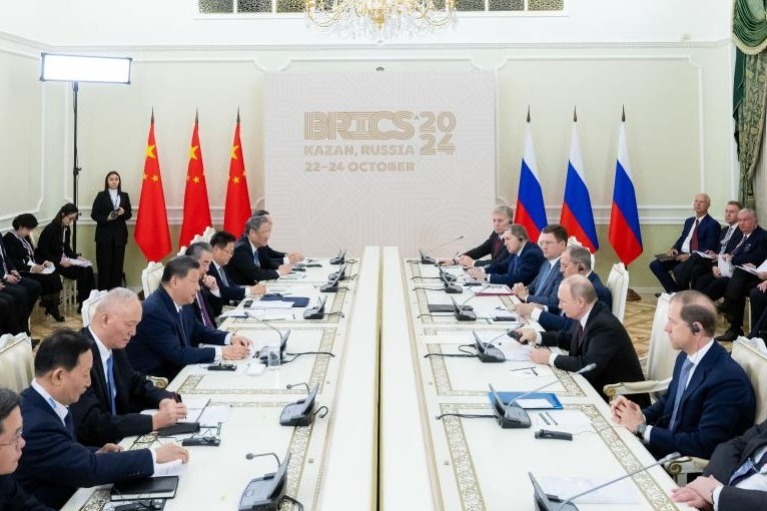Cambodia-China friendship unbreakable
By Kin Phea | chinadaily.com.cn | Updated: 2022-11-07 14:55

Phrases such as "most trusted friend", "a friend in need is a friend indeed", "ironclad friendship", "comprehensive strategic partnership" and "China-Cambodia community of shared future" are often used to describe Cambodia-China relations and cooperation.
Historically, China-Cambodia relations date back to the 13th century. In the modern era, official diplomatic relations between the two sides were established on July 19, 1958. Since then, as close neighbours, Cambodia and China have forged and nurtured an unbreakable, "ironclad" friendship that has weathered many storms and overcome many difficulties.
Cambodian Prime Minister Hun Sen, on many occasions, has publicly reiterated that China is the country's "most trusted friend". The friendship between the two countries is rooted in the five principles of peaceful coexistence: mutual respect for each other's sovereignty and territorial integrity, mutual non-aggression, mutual non-interference in each other's internal affairs, equality and mutual benefit, and peaceful co-existence.
Politically, Cambodia is one of China's oldest and closest partner countries, with the two sides exchanging regular state- and other high-level visits. Cambodia has also been one of the strongest supporters of the one-China principle. As Hun Sen has emphasized, Cambodia will never change its one-China principle, which former king and prime minister Norodom Sihanouk always adhered to, and "as the inheritor of the policy, I will continue to pursue it."
Economically, China is Cambodia's top foreign investor, a major donor and an increasingly important trading partner. China's vision for global development and ever-closer relations with Cambodia are seen in its track record of investment. According to Council for the Development of Cambodia data, Chinese investment made up the largest share (21.81 percent) of the total foreign direct investment approved by Cambodia from 1994 to 2019.
In the early years, China made extensive investments in infrastructure, energy and resources development sectors. In 2021, China topped the list of investors with a total investment of $2.32 billion, up 67 percent year-on-year. And by 2017, Cambodia had received about $4.2 billion in official development assistance, in the form of grants and soft loans, from China.
Culturally, Chinese values are deeply embedded in many aspects of Cambodian society. And strong people-to-people ties and social relations form a solid base for the continuous growth of friendly cooperation between Cambodia and China.
In fact, Sino-Cambodian cooperation has deepened in all fields in recent years, facilitating the development of high-level bilateral relations. In 2006, the two countries raised their bilateral relations to the level of "comprehensive partnership of cooperation", upgrading it to "comprehensive strategic partnership" in 2010.
Besides, Cambodia was among the first countries to endorse and embrace the Belt and Road Initiative proposed by China in 2013, acknowledging that the initiative would create significant economic opportunities.
In 2016, the two sides signed a memorandum of understanding on the formulation of a cooperation plan to jointly build the Silk Road Economic Belt and the 21st Century Maritime Silk Road, which together make up the Belt and Road Initiative. A year later the two countries signed the "Outline of Bilateral Cooperation Plan to Jointly Build the SREB and the MSR", which prioritized seven areas for deepening cooperation: infrastructure; agriculture; capacity building; industrial cluster; culture and tourism; finance; and eco-environmental protection.
In April 2019, Cambodia and China signed the Action Plan 2019-23 for Building a China-Cambodia community of shared future, under which the two countries would take 31 measures in the fields of politics, security, economics, people-to-people relations, and multilateral cooperation. More recently, in October 2020, the two sides signed a free trade agreement, which marked the beginning of a new era of comprehensive strategic cooperation between them.
Cambodia's key role in the Belt and Road Initiative and strong partnership with China in trade and investment are manifested in the China-Cambodia free trade agreement and reflected in Cambodia's support for China's Global Development Initiative and Global Security Initiative, and efforts to help build a community with a shared future for mankind.
The COVID-19 has tested global solidarity, and countries' resiliency against and capability to respond to medical emergencies. When Cambodia faced the severest health challenge, China did its best to help it contain the spread of the novel coronavirus. On the other hand, Hun Sen's visit to China in February 2020, when the pandemic situation in China was still grave, demonstrated Cambodia's strong support for China.
China's support in Cambodia's battle against the pandemic, which includes millions of doses of vaccines, proves Hun Sen made the right decision by choosing China as the main source of COVID-19 vaccines and strategic vaccine supplier. China has also played an important role in Cambodia's post-pandemic economic recovery.
As for the South China Sea issue, Cambodia has exhorted all parties to settle their differences peacefully and continue using the ASEAN-China mechanism for the full implementation of the Declaration on the Conduct of Parties in the South China Sea, and for China and the Association of Southeast Asian Nations to keep working together to finalize the "Code of Conduct" for the South China Sea.
Importantly, Cambodia's neutral and fair stance on the South China Sea issue contributes to the maintenance of peace, security and stability in the region, and promotes cooperative relations and bolsters the mutually beneficial strategic partnership between ASEAN and China.
Cambodia also has good relations with China at the multilateral level under the ASEAN+1, ASEAN+3, and the Lancang-Mekong cooperation frameworks. The two sides firmly uphold multilateralism in trade, too, under the framework of the World Trade Organization.
Cambodia's "ironclad friendship" with China both strengthens and broadens China-ASEAN cooperation, which will help protect the rights and interests of developing countries, increase mutual understanding and trust, and maintain regional peace and stability.
More important, despite the pandemic, ASEAN and China remain each other's largest trading partners and are maintaining their growth momentum.
Cambodia-China ties continue to diversify, both on the bilateral and multilateral levels, while gaining in strength in all areas of common interest. That the two countries are jointly addressing common and global challenges, strengthening contacts at all levels and across platforms, and deepening mutual understanding will ensure they make greater achievements both at the national and global level. After all, China-ASEAN relations have entered a new stage of comprehensive strategic partnership from where their cooperation can only deepen and mutual benefit can only increase.
The author is the director-general of the International Relations Institute of Cambodia, Royal Academy of Cambodia.
The views don't necessarily reflect those of China Daily.
If you have a specific expertise, or would like to share your thought about our stories, then send us your writings at opinion@chinadaily.com.cn, and comment@chinadaily.com.cn.
























